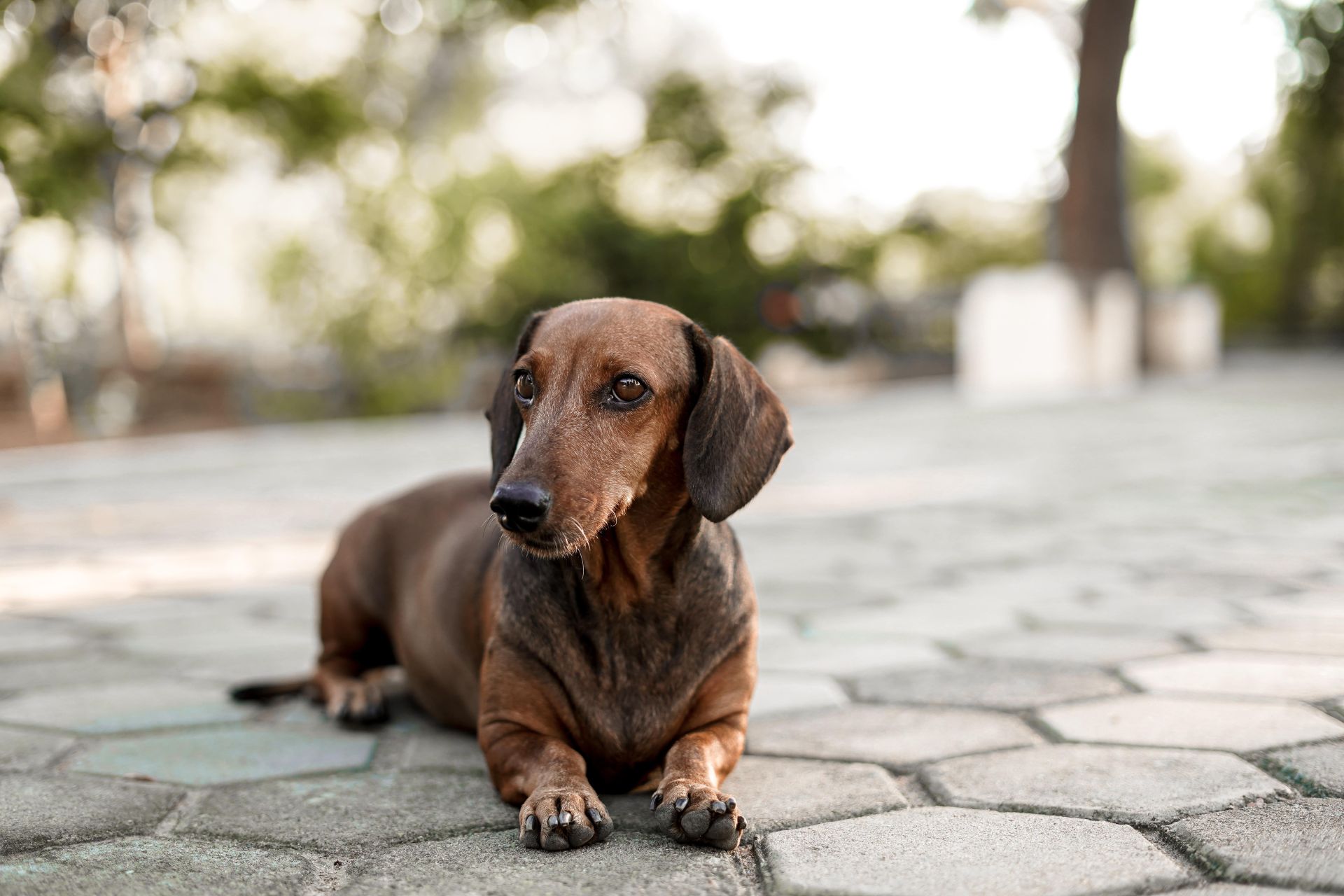Dachshund
Showing the single result

The Dachshund has one of the most distinctive silhouettes among all dog breeds. Its long, low body and short, stubby legs have earned it the name “sausage dog” among many of the breed’s fans.
Dachshunds have been popular in both real life and in pop culture, owing to their fun-loving and lively personalities. While they are now kept as companion dogs, they also have a long history of being alert watchdogs and fierce hunters.
Temperament
It’s exceedingly rare to meet a shy or withdrawn Dachshund. These energetic and outgoing dogs pack a lot of personality into their tiny bodies. Most Dachshunds are both playful and affectionate toward humans, never turning down an opportunity to cuddle on the couch or go for a run around the block. Dachshunds love to be close to people, and their intelligence causes them to get into all sorts of mischief. A well-trained and properly socialized Dachshund is a wonderful family dog, so long as you take care of their sensitive backs and are able to give them sufficient mental and physical stimulation.The Ultimate Guide to Dachshund
Origins
There have been Dachshunds that can be traced back as far as the 15th century, though the intentional development of the breed began in the 17th century. This German breed of hunting dog was intended to hunt badgers – the name Dachshund literally translates to “badger dog.” The Dachshund is technically a scent hound, but its original duties were more similar to that of a terrier. Modern Dachshunds still retain some of these traits, being adept at tracking down and chasing small animals.
Key Characteristics of Dachshund
| Dachshund | It’s exceedingly rare to meet a shy or withdrawn Dachshund. These energetic and outgoing dogs pack a lot of personality into their tiny bodies. Most Dachshunds are both playful and affectionate toward humans, never turning down an opportunity to cuddle on the couch or go for a run around the block.
Dachshunds love to be close to people, and their intelligence causes them to get into all sorts of mischief. A well-trained and properly socialized Dachshund is a wonderful family dog, so long as you take care of their sensitive backs and are able to give them sufficient mental and physical stimulation. |
| Exercise Needs | While Dachshunds are energetic, some special care needs to be taken to ensure their health and wellbeing. They need enough exercise to build supportive muscles in their back to protect their spines. Dachshunds will easily work themselves to exhaustion if you let them, so careful management of the length of exercise sessions is vital.
A couple of 15 to 20 minute walks and a play session each day is typically enough to fulfill their needs. It’s best to avoid letting them go up and down stairs or jump down from furniture, as the repetitive action may cause back and spine issues. |
| Dachshund Grooming | Most Dachshunds are fairly low-maintenance dogs, requiring only occasional baths. No matter the coat type of your Dachshund, they require weekly brushing to get rid of shed fur and dander.
One area where Dachshunds need extra care is their long, droopy ears. It’s common for dirt and debris to get stuck underneath and inside the ear, which may lead to ear infections in the long run. Careful inspection and cleaning of the ear should be done around once a week. Tooth brushing two to three times a week and regular nail trimming should be standard. |
| Dachshund Training | Dachshunds are occasionally known to be stubborn and difficult to train. This is because of their high intelligence and ability for intense focus as hunting dogs. A Dachshund that is interested in something else will be able to ignore their owner. Training a Dachshund puppy as soon as you get them will go a long way towards tempering this behavior.
A Dachshund owner must be patient and firm to achieve the best results with training. Finding the proper motivation for your Dachshund is usually the key to get them to listen. Many Dachshunds are food-motivated and will follow commands in exchange for treats. |
| Dachshund Lifespan And Health Issues | Dachshunds can live slightly longer than other dogs, up to 12 to 16 years of age. Dachshunds may be prone to:
|
| Dachshund Size and Space Requirements | Dachshunds are a small breed, and standard Dachshunds will generally only weigh between 16 to 32 pounds. Miniature Dachshunds will be below 11 pounds. They stand between 8 to 9 inches at the shoulder for standard Dachshunds, and 5 to 6 inches for miniature Dachshunds.
Dachshunds don’t need a lot of space, and can fit into almost any size of home. The only consideration that needs to be made is that Dachshunds should not be forced to go up and down stairs to navigate their home. Dachshunds love to dig, and will happily create holes in any outdoor space you may have. Despite loving the outdoors, Dachshunds are not suited to long-term living outside. They are primarily indoor dogs. |
Other considerations:
- Dachshunds are known for being barkers, and their alert and protective nature means that they will bark at nearly anything that approaches their property. Training from an early age is necessary to teach your Dachshund the acceptable times to bark.
- There are three coat types for Dachshunds: smooth, long-haired, and wiry. Smooth Dachshunds are the most common, with long-haired Dachshunds coming second and wiry-haired Dachshunds the least common. Wiry-haired Dachshunds are slightly more resistant to adverse weather conditions. Grooming schedules will be similar for all three types.
- Well-socialized and trained Dachshunds are good with almost all people. Their outgoing and friendly personalities make them suited to being therapy dogs.
How can I take good care of my Dachshund or Puppy?
Proper socialization
Socializing your Dachshund puppy should happen as soon as possible after you bring them home. While most reputable dog breeders will only release puppies at 8 weeks old, too young for a complete set of vaccinations, it is still possible to do socialization work even if the puppy cannot walk around. The period from 8 to 12 weeks of age is critical for puppies to develop the proper behaviors that will carry on into adulthood.
Proper nutrition
Since Dachshunds are a small breed, it’s important to get them high-quality, premium dog food. Ideally, their dog food should be specially formulated for their size or breed. Your breeder may recommend a specific brand or type of kibble. It’s generally a good idea to give this brand of dog food to your Dachshund and slowly transition them to your preferred dog food. Small meals 3 to 4 times a day is a good rule of thumb for most Dachshund puppies, since their stomachs cannot handle their entire daily allotment of food in one sitting. Weighing out your Dachshund’s meals can help keep them from becoming overweight. Your veterinarian may have more specific recommendations for your Dachshund.
Up-to-date vaccinations
Dachshund puppies, like most other dogs, will go through a couple of rounds of vaccinations in the first few weeks or months with you. Follow the schedule your veterinarian gives you to ensure that your Dachshund is adequately protected from common transmissible diseases. Most puppies will not be allowed to interact with other dogs until the 14th to 16th week of life.
Most Asked Dachshund Questions
-
+How Much do Dachshund Puppies Cost
